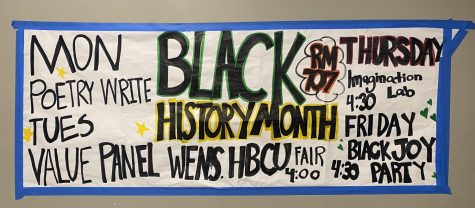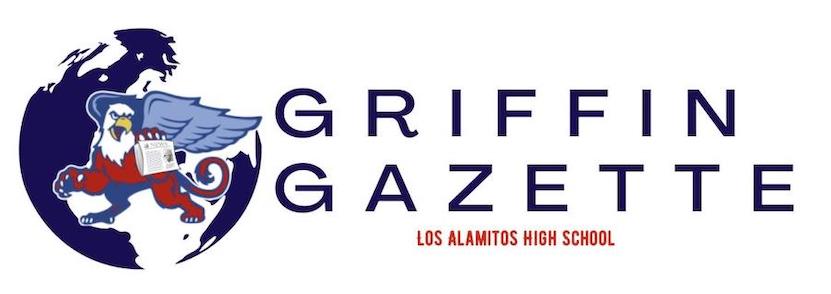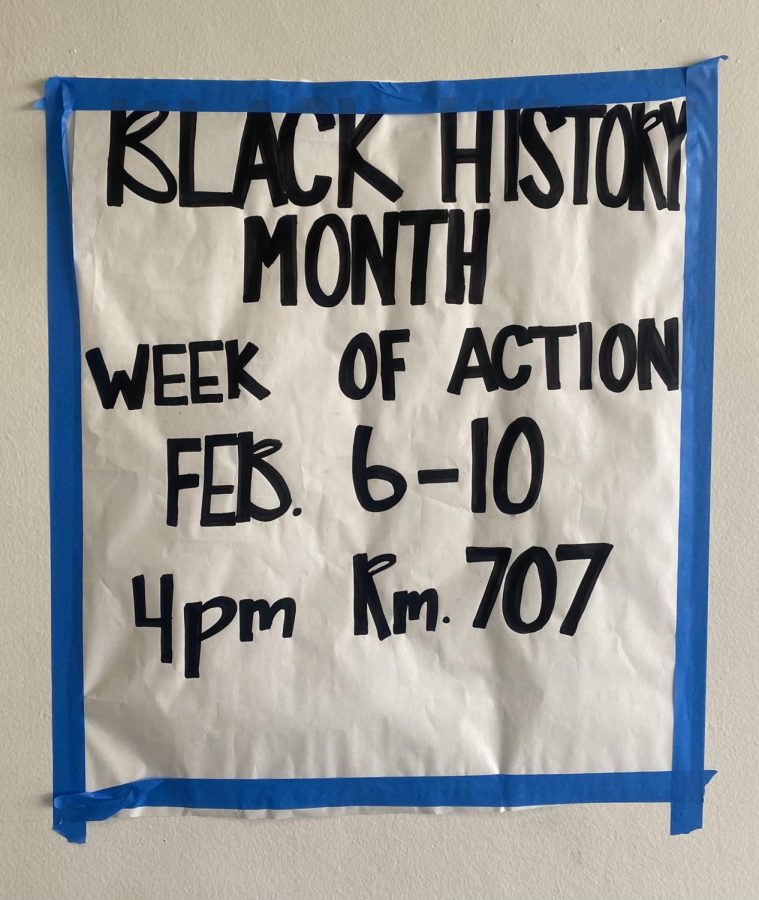February is Black History Month
The history and overview of Black History Month and what we are doing to celebrate it.
A poster hung up in the hallway of LAHS made by the Ethnic Studies Club.
February 7, 2023
LOS ALAMITOS, CA — Every year since 1976, people all across the world have celebrated Black History Month during February.
It all started in Chicago in the summer of 1915. Dr. Carter G. Woodson, a graduate of the University of Chicago, traveled from Washington, D.C. to take part in a nationwide commemoration of the 50th anniversary of liberation organized by the state of Illinois.
The Association for the Study of Negro Life and History, now known as the Association for the Study of African American Life and History, was founded on September 9 at a meeting between Woodson, A. L. Jackson, and three other people at the Wabash YMCA (ASNLH).
It is widely believed that Woodson chose the month of February to coincide with the birthdays of two notable Americans who contributed significantly to the development of black history: Abraham Lincoln and Frederick Douglass, whose birth dates are the 12th and 14th respectively.
“If a race has no history, if it has no worthwhile tradition, it becomes a negligible factor in the thought of the world, and it stands in danger of being exterminated,” said Dr. Carter G. Woodson.
Later, President Gerald Ford officially recognized February as Black History Month in 1976 so that the world could take the chance to recognize the too often overlooked contributions made by black Americans throughout history in all fields of endeavor.
The United States, Canada, the United Kingdom, Ireland, the Netherlands, and Germany all formally observe Black History Month. Black History Month is celebrated in February in both the US and Canada. But October has been recognized as Black History Month in the UK, Holland, and Ireland.
“All year round it’s important to study the contributions of everyone,” said senior Rommel Salazar. “No matter their race it is very crucial to understand that they are important for building societies.”
Black History Month honors these individuals, and others, who have changed the world.
As two of the most known people in the world, Martin Luther King Jr. and Rosa Parks were people who changed the course of history with their impact on the civil rights movement.
MLK Jr.’s “I Have a Dream” speech and Parks’ Montgomery bus boycott affected millions of people around the world and influenced huge changes in other people’s perspectives.
Other people who were important in history are Booker T. Washington, Sojourner Truth, the Tuskegee Airman, Toni Morrison, and Ida B. Wells. They are just the beginning of the amazing list of people that were a part of Black History.
Washington was an American educator, novelist, orator, and advisor to multiple presidents of the United States. He dominated both the African-American community and the modern black aristocracy from 1890 and 1915.
Truth, a former slave, was a prominent supporter of abolition, temperance, civil rights, and women’s rights in the nineteenth century.

The Tuskegee Airmen were the first African American troops to successfully complete their training and join the Army Air Corps. The Tuskegee Flyers were a group of predominantly African American military pilots and airmen who served together during World War II.
Ida B. Wells was an educator and a pioneer in the civil rights movement. She was a founding member of the National Association for the Advancement of Colored People (NAACP). She was an American journalist and activist of African descent who led an 1890s anti-lynching campaign. She also advocated for women’s voting rights.
Toni Morrison is an American novelist who wrote a novel that Los Al seniors read in AP Lit and Modern Lit called “Beloved.” The novel is based on the true story of an African-American enslaved woman. For 25 weeks, this book was on the bestseller list, and it received numerous honors, including the Pulitzer Prize for Fiction. Morrison won the Nobel Prize in Literature in 1993, making history as the first Black woman to receive it.
They all continued to fight for the right to Black freedom their whole lives as well as hundreds of others who changed the course of history with their resilience.

This week, February 6th–10th, is designated by the Ethnic Studies Club as a Week of Action to honor Black history by promoting with blacklivesmatteratschool.com.
Monday, the 6th, was a poetry write; Tuesday is the value panel; Wednesday is the HBCU fair at 4 pm; Thursday is the Imagination Lab at 4:30 pm; and Friday is the Black Joy Party at 4:30 pm.
This is all happening in Rm. 707, Mrs. Aviña’s classroom, and anyone can go in and check it out at 4 pm after school.
“Ethnic Studies Club is very passionate about this, and it is very important to highlight black voices and black youths because they don’t get the representation they deserve,” said Jonas Corliss, a senior at LAHS.
The morning announcements spread more facts and information all this week as well.
Los Alamitos High School hopes to see students attending these events as well as celebrating in their own way to continue to spread and remember Black History.






